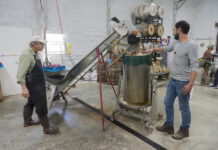With the growth of the distilling business, landlords are paying more attention to potential tenants in this industry, which present a viable solution for spaces left vacant by traditional retailers. The number of active craft distilleries in the United States has increased from 195 in 2005 to 1,308 in 2016 (American Distilling Institute). Expansion in the industry is expected to continue. As of 2015, craft distillers produce two percent of distilled spirits in the United States market, which is expected to grow to 12 percent in 10 years (Reuters). Changes in state regulations have made the liquor industry more accessible. Distilleries are a destination or experience that lure consumers away from their phones and tablets and increase foot traffic at multi-tenant properties. As a result, distilleries are an attractive tenant. Distilleries are now in a much better position to negotiate favorable terms for their leases and present an attractive use to municipalities looking for positive contributions to their local economies.
When a distillery is negotiating a new lease, it should obtain contingencies for the various federal, state and local approvals it will need to operate. Most municipalities have not caught on to the craft-alcohol trend, so it is unlikely that the local zoning code will permit a distillery, regardless of the zoning district. Furthermore, even if the use is permitted, the distillery will probably need to obtain site plan approval. In most states, local land use approvals take at least six months to a year to obtain. In addition, licensing approval for the manufacture and sale of distilled spirits, which is typically governed by a state agency, can take up to six months or more, depending on the state. On the federal level, a permit from the Alcohol and Tobacco Tax and Trade Bureau can be obtained in about three months. The various permits and approvals can be sought concurrently. Therefore, a contingency for the approvals of at least six months, and preferably one year, should be obtained. The contingency should permit the tenant to terminate the lease within the six-month or one-year period if any of the approvals or permits is not obtained within such time frame. If financing for the fit out/start-up costs is also required, then financing (usually takes two to six months) can also be included in this contingency period if the landlord will permit it.
When negotiating a lease, a landlord will consider certain concessions in order to attract a good tenant. Most landlords will amortize its costs of the concessions over the term of the lease, and consider the costs in the rental rate. However, for a start-up distillery, which has high up-front costs, concessions can help reduce the initial out of pocket expenses. One concession landlords may offer is a free or reduced rent period to offset some of the high up-front costs incurred by the distillery. A landlord may also offer a shorter initial term with options to renew, which is preferable to a longer initial term for a start-up distillery. In addition, a right of first refusal or right of first offer to expand the leased space could benefit a distillery that has storage needs as it grows.
Another concession that a landlord may offer is a tenant improvement allowance, whereby the landlord pays for all or a portion of the construction fit out costs of the tenant. Sometimes the landlord will want its contractors to do the work. A distillery should try to obtain a tenant improvement allowance that permits the use of its own contractors. It is important that a start-up distillery use an architect and contractors that understand the unique layout issues for this industry, such as required bonded areas and location of equipment. A mistake in the floor plan or fit out could result in costly delays and corrective work in order to comply with regulatory requirements. As a result of the unique issues in the fit out that a distillery must address, a distillery should use its own architect and contractor rather than the landlord’s contractors.
Moreover, although it would be ideal to have the fit out plans prepared and approved by a landlord prior to the lease being signed, that is not always feasible. Therefore, the procedure for the landlord’s approval of the plans set forth in the lease needs to be flexible and should not overly restrict or delay the distillery’s project. The procedure for change orders should also be flexible. The distillery should seek a reduction (or complete removal) of any fees charged by the landlord for plan reviews with respect to the initial fit out. Furthermore, the lease should be clear that the equipment and trade fixtures installed by the tenant remain the property of the tenant. Similarly, any lien rights of the landlord should exclude the distilling equipment, since most of the time this equipment is financed and will be subject to the lender’s lien. This will save a headache and delay later since the tenant would need to obtain a release or subordination of the landlord’s lien in order to obtain financing for its equipment. If the distillery is obtaining bank financing, the landlord should subordinate its lien rights to the distillery’s lender.
A distillery should also make sure it carefully reviews the “permitted use” clause set forth in the lease. The use description should be as expansive as possible and should include i) manufacturing, bottling and sale of distilled spirits; ii) on-site consumption of distilled spirits; iii) on-site consumption of food (to the extent permitted by state regulations); iv) private events and parties; and v) any other use permitted by a distillery license holder pursuant to the applicable state regulations. However, distilleries should keep in mind that a landlord may not want to agree to the broad catchall provision in (v) if it is a multi-tenant location. If that is the case, then the distillery should identify all possible uses of the space under the current state regulations and any pending legislation. In addition, the distillery should negotiate the right to sublease its space to other distillers that may desire to use its equipment. The lease should also provide flexibility for an assignment in the event the distillery is acquired.
If the distillery is purchasing real estate, then it should include the same contingencies in the purchase agreement as in a lease—federal, state and local approvals and financing. In addition, the distillery should include a contingency for a title review and inspections of the property (including an environmental investigation). When purchasing real estate for a distillery, the distillery should consider whether the location fits within its business model (i.e., downtown social atmosphere versus production focused in an industrial facility) and whether sufficient parking and utilities are available.
Regardless of whether a distillery is leasing or purchasing property for its operations, it will need to obtain municipal approvals and convince the municipality that its proposal complies with its ordinances; or if it does not, it is an appropriate use for the zoning district. In addition, the distillery will need to show that either the site layout will meet the district’s bulk standards or the variance relief is appropriate. The distillery should determine what variance relief is required in advance of signing a purchase agreement or lease. A distillery should meet with the municipal officials early in the process and promote the distillery as a viable business that will bring excitement to the town and have a positive impact on economic development.
The distillery should make sure it understands the landscape and municipal land use board dynamics before the public hearing on its application. It should be in full communication with the municipality’s officials and professionals and be clear about the proposal for its project. To the extent it can, the distillery should talk to the neighbors and gain their support. If the landlord or seller has any influence in the municipality, the distillery should seek their help. Issues that may come up during the municipal land use hearing include the distillery’s business plan, impact on traffic, number of employees, parking availability, plan for deliveries to the site, noise/hours, storage, garbage disposal, security and consumption of alcohol on-site. The distillery should be prepared to address all of these issues.
The key to the success of a distillery with respect to buying or leasing real estate is conducting due diligence and communication. The distillery should investigate potential issues as early in the process as possible to avoid unnecessary expense. In addition, the distillery should be up-front with the landlord when making an offer to lease and explain exactly what it will need in the lease. Moreover, whether buying or leasing, the distillery should be clear about its proposal to the municipality and make sure that its project will be viewed as a positive for the town. It does not make sense to waste time (and money) if a landlord or municipality is unwilling to be flexible and work with the distillery.








